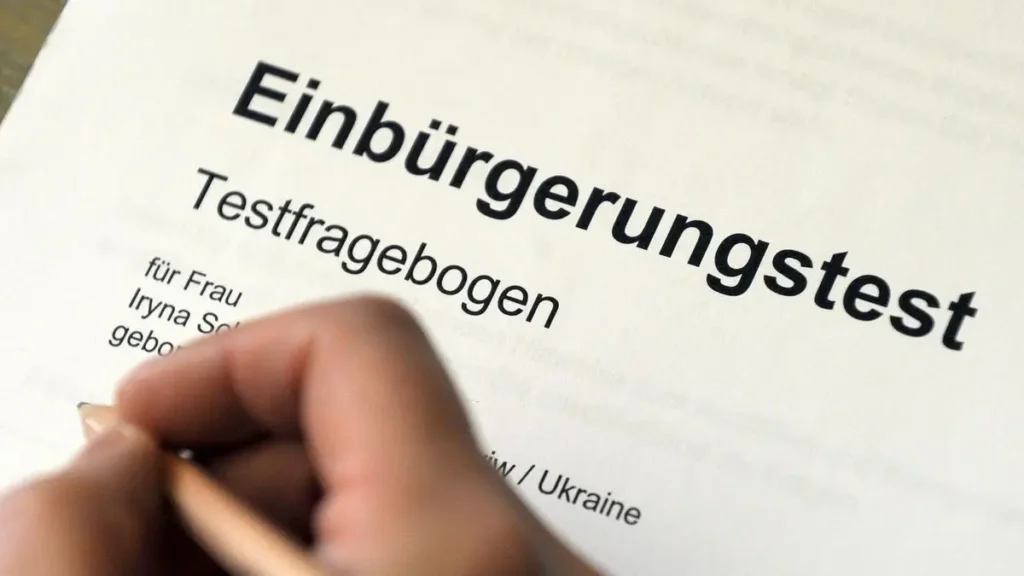Are you wondering about the German naturalization requirements and considering becoming a German citizen? The process, known as Einbürgerunug, has recently undergone significant changes. The article covers the key changes in the German naturalization requirements and process, including reduced residency requirements, allowance for dual citizenship, language proficiency requirements, and other important aspects of the application process.
- 1. New German Citizenship Law Highlights
- 2. Key Changes in German Naturalization Requirements
- 3. Eligibility Criteria for German Citizenship
- 4. The Naturalization Process
- 5. Special Provisions
- 6. Dual Citizenship Considerations
- 7. Integration Requirements
- 8. Challenges and Criticisms
- 9. Frequently Asked Questions
- 10. Final Thoughts
1. New German Citizenship Law Highlights
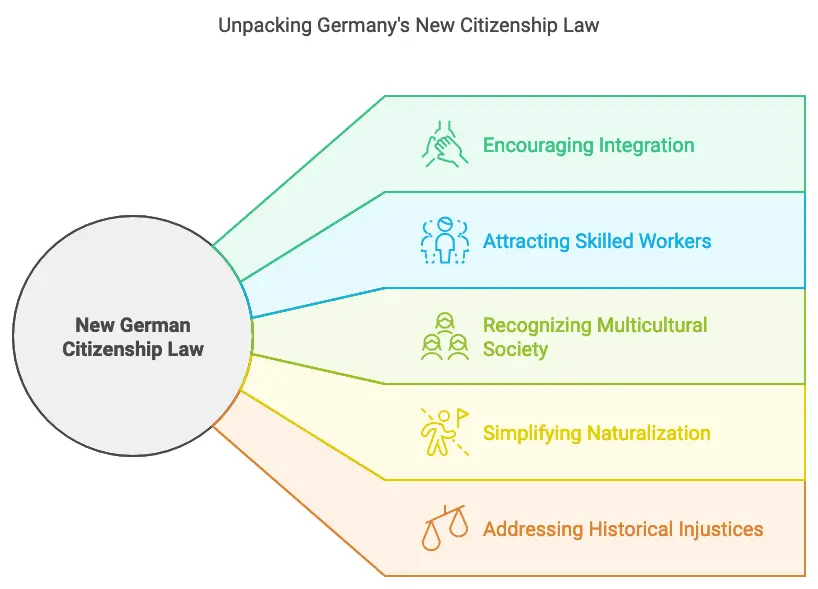
The new German Citizenship Law represents a major overhaul of the country’s naturalization policies. It aims to simplify and streamline the process of acquiring German citizenship while promoting integration and recognizing the contributions of long-term residents to German society.
Key objectives of the new law include:
- Encouraging integration by reducing barriers to citizenship
- Attracting and retaining skilled workers from abroad
- Recognizing the multicultural nature of modern German society
- Simplifying the naturalization process for long-term residents
- Addressing historical injustices by providing special provisions for certain groups
These changes reflect Germany’s commitment to becoming a more inclusive and welcoming country for immigrants while maintaining its strong emphasis on integration and civic participation.
2. Key Changes in German Naturalization Requirements
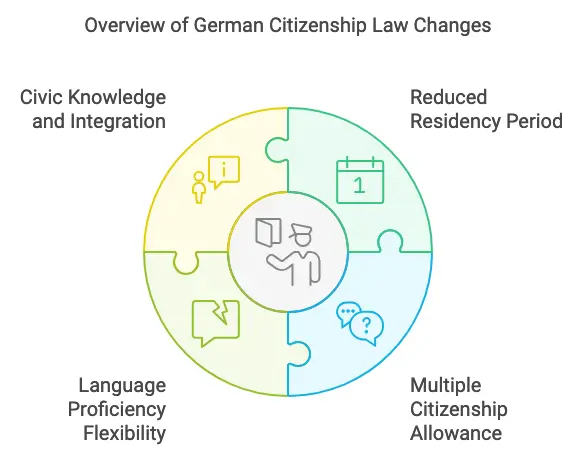
The new German Citizenship Law introduces several significant changes to the naturalization requirements. These modifications aim to make the process more accessible and inclusive for a wider range of applicants.
2.1 Reduced Residency Period
One of the most notable changes is the reduction in the required period of legal residency in Germany before applying for citizenship. Under the new law, the general residency requirement has been reduced from eight years to five years. This change recognizes that integration often occurs more quickly than previously assumed and allows long-term residents to apply for citizenship sooner.
In some cases, the residency requirement may be even shorter:
- Three years for individuals who have shown exceptional integration efforts
- Three years for spouses of German citizens (down from previously required four years)
This reduction in residency requirements is expected to encourage more long-term residents to apply for citizenship and fully participate in German society.
2.2 Multiple Citizenship Allowance
Another groundbreaking change in the new law is the allowance of multiple citizenship. Previously, most applicants for German citizenship were required to renounce their original citizenship, with some exceptions for EU citizens and cases where renunciation was not possible or would cause significant hardship.
Under the new law, dual or multiple citizenship are generally permitted for all applicants. This change recognizes the reality of global mobility and allows individuals to maintain ties with their countries of origin while fully integrating into German society.
It is anticipated that the adoption of dual citizenship will eliminate a major obstacle that prevented many long-term residents from submitting applications for German citizenship in the past.
2.3 Language Proficiency Requirements
While language proficiency remains a crucial aspect of the naturalization process, the new law introduces some flexibility in this area. The general requirement is set at the B1 level of the Common European Framework of Reference for Languages (CEFR), which reflects an intermediate level of German language skills.
However, the new law recognizes that language acquisition can be more challenging for some individuals and introduces provisions for certain groups:
- Applicants over 67 years old may be exempt from formal language tests
- Individuals with learning disabilities or other special circumstances may be granted accommodations
- Recognition of alternative evidence of language skills, such as completion of German-language education or long-term employment in a German-speaking environment
These changes aim to make the language requirement more achievable while still ensuring that new citizens can effectively communicate and participate in German society.
2.4 Civic Knowledge and Integration

The new law maintains the requirement for applicants to demonstrate knowledge of the German legal and social system, as well as living conditions in Germany. This is typically assessed through a standardized naturalization test.
However, the law now places greater emphasis on practical integration rather than just theoretical knowledge. New provisions include:
- Recognition of voluntary work or civic engagement as evidence of integration
- Consideration of participation in integration courses and language classes
- Acknowledgment of professional and educational achievements in Germany
These changes reflect a more holistic approach to assessing an applicant’s integration into German society, recognizing that citizenship is not just about knowledge but also about active participation in the community.
3. Eligibility Criteria for German Citizenship
While the new German Citizenship Law has made significant changes to German naturalization requirements, there are still several key eligibility criteria that applicants must meet. Understanding these criteria is crucial for anyone considering applying for German citizenship.
3.1 Age Requirements
The new law maintains the existing age requirements for citizenship applicants:
- Applicants must be at least 16 years old to apply independently
- Children under 16 can be included in their parents’ applications
- There is no upper age limit for applying for citizenship
It’s worth noting that special provisions exist for young adults who have grown up in Germany, which we’ll discuss in more detail in the section on special provisions.
3.2 Legal Residency Status
To be eligible for naturalization, applicants must have a valid residency permit at the time of application. This can include:
- Permanent residence permit (Niederlassungserlaubnis)
- EU long-term residence permit
- Temporary residence permit (Aufenthaltserlaubnis) with the prospect of permanent residency
It’s important to note that time spent in Germany on a student visa or as an asylum seeker before receiving refugee status may only partially count towards the residency requirement.
3.3 Financial Self-Sufficiency
Applicants must demonstrate their ability to support themselves and their dependents without relying on social welfare benefits. This requirement includes:
- Stable employment or self-employment
- Adequate income to cover living expenses
- Contributions to the German pension system (for employed individuals)
Exceptions may be made for individuals who are unable to work due to disability or other circumstances beyond their control.
3.4 Criminal Record Considerations
A clean criminal record is generally required for naturalization. The new law maintains strict requirements in this area:
- Applicants must not have been convicted of a serious criminal offense
- Minor offenses or fines below a certain threshold may be overlooked
- A history of extremist or anti-constitutional activities can lead to rejection of the application
The exact impact of a criminal record on a citizenship application can vary depending on the nature and severity of the offense, as well as the time elapsed since the conviction.
4. The Naturalization Process
Understanding the naturalization process is crucial for anyone considering applying for German citizenship. While the new law has streamlined some aspects of the process, it still involves several steps and requirements.
4.1 Required Documents
Applicants for German citizenship typically need to provide the following documents:
- Valid passport or travel document
- Birth certificate
- Marriage certificate (if applicable)
- Proof of legal residency in Germany
- Proof of language proficiency (typically a B1 level certificate)
- Certificate of successful completion of the naturalization test
- Proof of income or employment
- Rental agreement or proof of home ownership
- Recent passport-sized photographs
All documents not in German must be accompanied by certified translations. It’s important to note that the exact requirements may vary depending on the applicant’s individual circumstances and the specific requirements of the local naturalization office.
4.2 Application Submission
The application for German citizenship is typically submitted to the local naturalization office (Einbürgerungsbehörde) in the applicant’s area of residence. The process generally involves the following steps:
- Contact the local naturalization office to schedule an appointment
- Attend the appointment to discuss your eligibility and receive application forms
- Gather all required documents
- Complete the application forms
- Submit the application along with all required documents and fees
Some municipalities offer convenient online pre-registration or document submission options, and usually, only one in-person appointment is needed.
4.3 Processing Time and Fees
The processing time for naturalization applications can vary significantly depending on the complexity of the case and the workload of the local naturalization office. On average, applicants can expect the process to take between 6 to 24 months from the time of application submission to the citizenship ceremony.
The fees for naturalization have been standardized under the new law:
- Standard fee for adults: €255
- Reduced fee for minor children included in their parents’ application: €51
Additional costs may include fees for language tests, the German naturalization test, and document translations. Some applicants may be eligible for fee waivers or reductions based on financial hardship.
5. Special Provisions
The new German Citizenship Law includes several special provisions that make naturalization easier for certain groups. These provisions recognize the unique circumstances of different applicants and aim to create more equitable pathways to citizenship.
5.1 Children and Young Adults
The law includes favorable provisions for children and young adults who have grown up in Germany:
- Children born in Germany to foreign parents automatically receive German citizenship if one parent has been a legal resident for at least eight years
- Young adults (up to age 21) who have lived in Germany for at least five years can apply for citizenship with a reduced residency requirement
- Time spent in the German education system counts towards the residency requirement
These provisions aim to ensure that individuals who have spent their formative years in Germany have easier access to citizenship.
5.2 Elderly Applicants

The new law recognizes that older applicants may face unique challenges in meeting standard German naturalization requirements:
- Applicants over 67 years old may be exempt from the formal language test requirement
- Alternative methods of demonstrating language skills are accepted for older applicants
- The civic knowledge requirement may be waived in cases where age-related factors make it difficult to pass the standard test
These provisions ensure that long-term elderly residents are not excluded from the possibility of naturalization due to age-related challenges.
5.3 Descendants of Nazi Persecution Victims
In recognition of historical injustices, the new law includes special provisions for descendants of individuals who were persecuted by the Nazi regime:
- Simplified naturalization process for descendants of Jews and other groups persecuted during the Nazi era
- Waiver of usual residency and language requirements
- Option to reclaim German citizenship that was lost due to Nazi persecution
These provisions are part of Germany’s ongoing efforts to address its historical responsibilities and provide restitution to affected families.
6. Dual Citizenship Considerations

One of the most significant changes in the new German Citizenship Law is the general acceptance of dual or multiple citizenship. This shift has important implications for both new applicants and existing German citizens.
6.1 Countries Allowing Dual Citizenship
While Germany now allows dual citizenship, it’s important to note that not all countries permit their citizens to hold multiple nationalities. Applicants should research the citizenship laws of their home country to understand the potential implications:
- Some countries automatically revoke citizenship upon acquisition of another nationality
- Others may require permission to maintain original citizenship
- Some countries have no restrictions on dual citizenship
Applicants are advised to consult with their home country’s embassy or a legal expert to understand the full implications of acquiring German citizenship.
6.2 Implications for Current German Citizens
The new law also affects current German citizens who may wish to acquire another citizenship:
- German citizens can now acquire another citizenship without losing their German nationality
- Those who previously lost German citizenship due to acquiring another nationality may be eligible to reclaim it
- The obligation to choose between German and another citizenship (Optionspflicht) for individuals who received German citizenship at birth has been abolished
These changes allow German citizens to embrace opportunities abroad without fear of losing their connection to Germany.
7. Integration Requirements
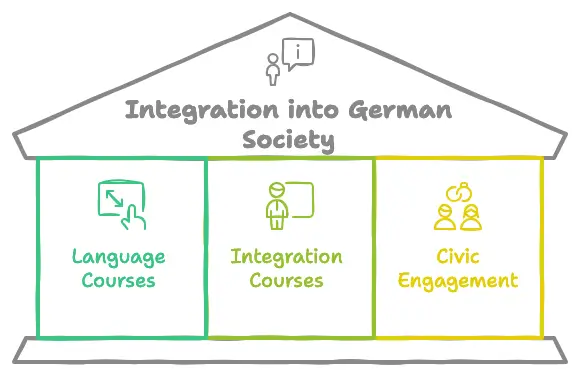
While the new law has made naturalization more accessible, it maintains a strong emphasis on integration into German society. Several key integration requirements remain in place and have been further developed.
7.1 Language Courses
Applicants are expected to demonstrate German language proficiency, typically at the B1 level. To support this requirement:
- Government-subsidized language courses are available through the Federal Office for Migration and Refugees (BAMF)
- Courses range from basic (A1) to advanced (C1) levels
- Some municipalities offer additional language support programs
Completing these courses not only helps meet the language requirement but also aids in overall integration into German society.
7.2 Integration Courses
In addition to language skills, applicants are expected to have knowledge of German society, culture, and legal system. To facilitate this:
- Mandatory integration courses cover topics such as German history, culture, and the political system
- Courses typically consist of 600 hours of instruction
- Successful completion of the course is often viewed favorably in the naturalization process
These courses provide valuable information and help newcomers navigate life in Germany more effectively.
7.3 Civic Engagement
The new law places increased emphasis on active participation in German society. This can be demonstrated through:
- Volunteer work in German community organizations
- Participation in local clubs or associations (Vereine)
- Engagement in school or workplace initiatives
Such involvement is seen as evidence of successful integration and commitment to the local community.
8. Challenges and Criticisms
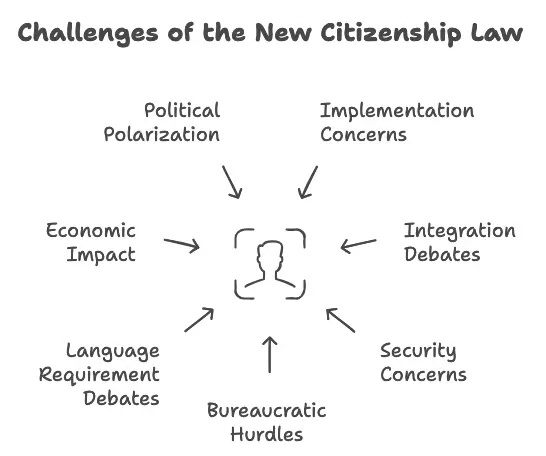
While the new German Citizenship Law has been widely praised for its more inclusive approach, it has also faced some challenges and criticisms:
- Implementation concerns: Some worry about the capacity of local authorities to handle an increased volume of applications.
- Integration debates: Critics argue that easing citizenship requirements might discourage integration efforts.
- Security concerns: Some political groups have raised questions about potential security risks associated with easier naturalization.
- Bureaucratic hurdles: Despite simplification efforts, the process can still be complex and time-consuming for many applicants.
- Language requirement debates: Some argue that the B1 level is too high for certain groups, while others believe it should be higher to ensure full integration.
- Economic impact: There are ongoing discussions about the potential economic effects of increased naturalization rates.
- Political polarization: The changes have been a subject of political debate, with different parties taking varying stances on the new law.
These challenges highlight the complex nature of citizenship and immigration policies in a diverse, modern society like Germany. As the new law is implemented, it’s likely that adjustments and refinements will be made to address these concerns.
9. Frequently Asked Questions
To help clarify some common queries about the new German naturalization requirements, here are answers to frequently asked questions:
A: Yes, the new law generally allows for multiple citizenships. However, you should check if your home country permits dual citizenship.
A: The general requirement is now 5 years, reduced from 8. This can be as short as 3 years in cases of exceptional integration.
A: Children born in Germany to foreign parents can receive German citizenship if at least one parent has been a legal resident for 8 years.
A: The standard fee is €255 for adults and €51 for minor children included in their parents’ application. Additional costs may apply for tests and document translations.
A: Under the new law, you generally don’t need to give up your current citizenship. However, some countries may require you to renounce your original citizenship upon acquiring a new one.
A: Processing times can vary, but typically range from 6 to 24 months from application submission to the citizenship ceremony.
A: Employment is not a strict requirement, but you generally need to show that you can support yourself without relying on social benefits. Exceptions may apply in cases of inability to work due to disability or other circumstances beyond your control.
10. Final Thoughts
The new German Citizenship Law marks a significant shift in Germany’s approach to naturalization, reflecting the country’s evolving identity as a diverse, multicultural nation. By reducing residency requirements, allowing multiple citizenships, and emphasizing practical integration over rigid criteria, Germany has taken important steps towards making citizenship more accessible to long-term residents and attracting skilled immigrants.
Key takeaways from the new German naturalization requirements include:
- Shorter residency periods for eligibility (generally 5 years, down from 8)
- Acceptance of multiple citizenship (Check list of the countries allowing multiple citizenship)
- Maintained emphasis on language proficiency and civic knowledge
- Special provisions for children, young adults, and elderly applicants
- Continued focus on integration and community engagement
While challenges and debates persist, the new law represents a progressive approach to citizenship in one of Europe’s largest economies. It balances the need for integration with the recognition of immigrants’ contributions to German society.
For those considering German citizenship, the path is now potentially shorter and more straightforward. However, it still requires commitment to learning the language, understanding German culture and institutions, and actively participating in society.
As Germany continues to navigate its role as a major destination for immigrants, these new German naturalization requirements will play a crucial role in shaping the country’s demographic and cultural landscape in the years to come. Whether you’re a long-term resident in Germany or considering moving there in the future, understanding these new pathways to citizenship is essential for planning your future in this dynamic and welcoming country.




